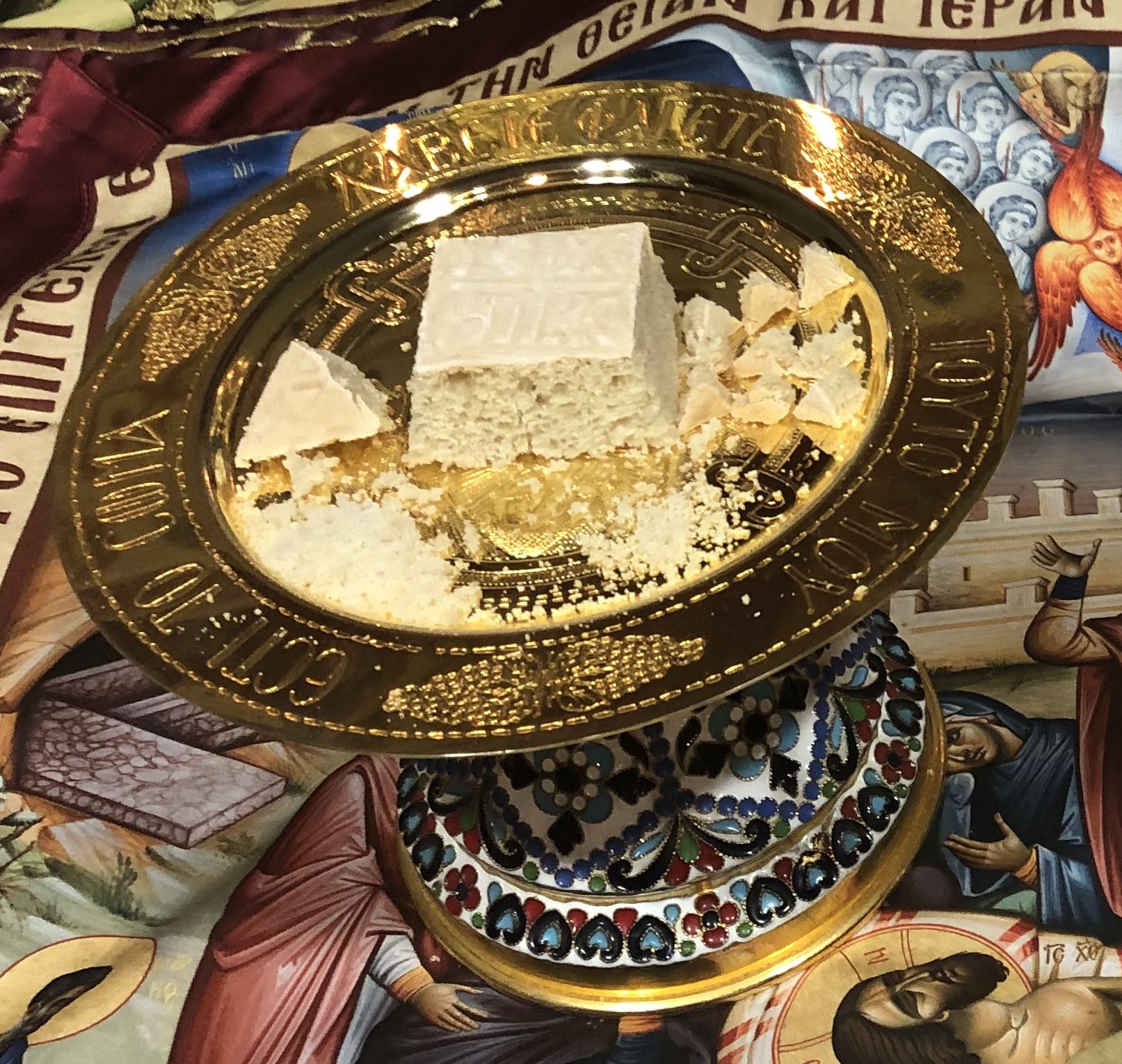She who is a real widow, and is left all alone, has set her hope on God and continues in supplications and prayers night and day.
I Timothy 5:5
When someone close to us dies, we feel sad, we cry, we mourn, we remember, we tell stories about them to keep their memory fresh in our minds. Can you imagine if someone died and no one felt sad, no one cried, no one came and no one remembered? In 2004, on Holy Monday in the parish in Asheville, North Carolina, where I was serving at the time, one such person died. I feel compelled to share her story because no one else in the world is talking about her today.
On Holy Monday in 2004, at 5:15 a.m., I received a called from a health care center saying that a woman named Stavroula (Stella) Anthopoulos had passed away. The person on the phone told me that not only was I listed on her chart as her priest but also as her next of kin. And then I heard the standard “if you don’t want to claim her, she will be cremated and placed in an unmarked grave at a local cemetery,” and completely forgotten about.
Stavroula was born in Greece. At one point she was married and was abandoned by her husband. She had a son, he too abandoned her. And she found herself living on a small pension in Asheville, North Carolina. Her money began to run out and her health took a turn downward. Because she waited too long to have cataracts removed, she lost her eyesight. With nowhere to turn, she became a ward of the state of North Carolina. She lived in a nursing home for the last seven years of her life—she was blind—she couldn’t see to read, or to walk or to watch TV. She couldn’t speak English, and so she often went days without talking to anyone. She was all alone in the world.
The anniversary of my ordination to the priesthood is May 15—I have always celebrated Liturgy on my anniversary and have always made a point of visiting someone in a hospital to mark that day each year. I was newly arrived in Asheville in May 2000 and my anniversary came. I asked if anyone was in the hospital and fortunately there wasn’t anyone. A lady named Mary Pappas told me about Stavroula, that she was alone in a nursing home and that only Mary was going to visit her. That day, Mary and I went to visit Stavroula.
For four years, Mary Pappas and I visited Stella faithfully at least seven or eight times a year—for Christmas, Epiphany, Holy Week, to sing “Christ is Risen” after Pascha (Easter), for August 15th (Dormition of the Virgin Mary, Mary’s nameday), for her nameday on September 14 (my nameday also), and every year on May 15, the anniversary of my ordination to the priesthood—after the Liturgy, I would always go and spend time with Stavroula. I could gather that she must have been a very faithful attendee at church services at some point in her life. It’s hard to know how to pray with someone who is so ill, yet is not about to die. It doesn’t seem right to pray for her to get better, or to pray for a peaceful ending either. So, we would pray for strength, and then we would sing hymns, and this would draw her out from her sometimes very withdrawn mood. She knew the words to all the hymns, which always amazed me. Even if she seemed unresponsive to our greeting, as soon as she heard singing, she would start making her cross and sing with us.
Our conversations were short but memorable—I remember one time she told me she had a dream and that she saw me in the dream celebrating the Liturgy. I asked her, what did I look like, since she was blind, she’s never actually seen me. I remember one time I asked if she wanted to receive Communion, and she said she had to wash her hands first, because she was dirty, and after we washed and dried her hands, then she received Communion. Her humility humbled me. Once Mary and I went to visit her and she was praying, she didn’t see us come in or hear us, and I motioned to Mary that we should be quiet and wait for her to finish her prayer. She asked in her prayer if “God could send Father and Mary” because she wanted to see us. We said, “Here we are Stavroula,” and she smiled and said, “That’s the quickest I’ve ever had a prayer answered.”
A few months before she died, she asked me to talk to her about what heaven is like. The week before she died on a Friday afternoon, I visited her for Holy Week, and she did an interesting thing. On every visit we would sing hymns from that liturgical period in the church year, and so the week before Holy Week, we sang hymns from Lent and Holy Week. She sang with us “Victorious Lady” (Ti Upermacho), and the hymn of Palm Sunday evening, “Behold the Bridegroom Comes”, and then abruptly stopped singing as we sang the hymns of Holy Week. And at the time, we couldn’t figure out why.
Shortly after we left, she suffered a massive stroke and I was told she was going to die very soon. I thought, maybe she stopped singing the hymns because she was not going to be alive during Holy Week, and sure enough she passed away Holy Monday morning, after we had sung the hymn of Palm Sunday night.
I’ve never cried so much at a funeral as I did when I buried Stavroula. Perhaps that is because there was no one else in the world who was crying for her, so God brought tears to my eyes. I remember doing all the arrangements for her funeral, and despite the fact that I did not pay to have her embalmed, got the least expensive casket and bought flowers from the market, it still cost me $6,000. About a month later, I mentioned to my congregation that I needed help paying off my $6,000 credit card bill from the funeral. That night, at a wedding, a guest came up to me at the reception and said that he had been in church and had heard about what I did for Stavroula. He handed me an envelope and told me to open it after I left the wedding reception. In the car, I opened the envelope and found $6,000 in cash. I went back in and asked the man his name, because I didn’t know him. He said “My name is Michael, like the Archangel, and that’s all you need to know.”
God’s sense of timing was perfect. My last year in Asheville, Holy Monday was April 5. That put her 40-day memorial on my anniversary, May 15. So I celebrated Liturgy and still visited Stavroula. And the only empty spot in the Greek section of the cemetery happened to be next to Mary Pappas, and she is buried there. On my last Sunday in Asheville, we dedicated her tombstone, which I designed, which reads “Behold the Bridegroom Comes, in the middle of the night, and blessed is the servant He shall find patiently waiting.” Mary Pappas passed away in 2021 and is buried next to Stavroula. Mary and I were Stavroula’s “family” and now that Mary is gone, I’m the only one left that talks about her, which is why she is included in this unit.
I didn’t know Stavroula in her healthy life. I don’t know what she did. I’m sure she had her joys and her sorrows, her triumphs and her mistakes. What I do know is that she’d led a very difficult existence for many years. She couldn’t see, or watch TV, or read, she had difficulty communicating since her English wasn’t very good, she was surrounded by strangers in a strange place, and was grateful for their love and care. While people were going about their lives, she was all alone, unable to do much of anything, but sit and pray. And yet, she was so happy to pray, eager to meet the Lord, she filled her days by praying by herself. And she remembered so many of the hymns of our church—as her eyes lost sight of the world, and her mind began to lose much of its abilities and knowledge, her heart always remembered God. She got frustrated often, and told us so, but she never lost faith. She truly was an example of what St. Paul writes about in the Epistle to the Corinthians (2 Corinthians 6:10), as a person “having nothing, and yet possessing everything.”
I pray that her eyes have now been reopened to see the glory of God in heaven, and while I was fortunate to have seen her for four years, I can only hope that I one day find myself in heaven, so she can see me.
Incline Thy ear, O Lord, and answer me, for I am poor and needy. Preserve my life for I am godly; save Thy servant who trusts in Thee. Thou art my God; be gracious to me, O Lord, for to Thee do I cry all the day. Gladden the soul of Thy servant, for to Thee, O Lord, do I lift up my soul. For Thou, o Lord, art good and forgiving, abounding in steadfast love to all who call on thee. Give ear, O Lord, to my prayer; hearken to my cry of supplication. In the day of my trouble I call on Thee, for Thou dost answer me. There is none like Thee among the gods, O Lord, nor are there any works like Thine. All the nations Thou has made shall come and bow down before Thee, O Lord, and shall glorify Thy name. For Thou art great and doest wondrous things, Thou alone art God. Teach me Thy way, O Lord, that I may walk in Thy truth; unite my heart to fear Thy name. I give thanks to Thee, O Lord my God, with my whole heart, and I will glorify Thy name forever. For great is Thy steadfast love toward me; Thou has delivered my soul from the depths of Sheol. O God, insolent men have risen against me; a band of ruthless men seek my life, and they do not set Thee before them. But Thou, O Lord, art a God merciful and gracious, slow to anger and abounding in steadfast love and faithfulness. Turn to me and take pity on me; give thy strength to Thy servant, and save the son of Thy handmaid. Show me a sign of Thy favor, that those who hate me may see and be put to shame, because Thou, Lord, hast helped me and comforted me. Psalm 86
Memory eternal, Stavroula!

